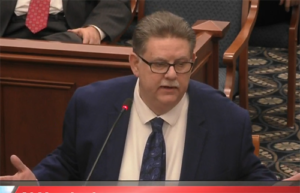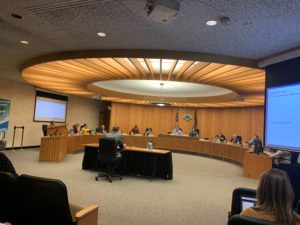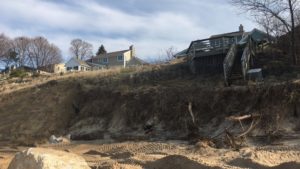Legislative Update 1-24-20
Bills to alter property tax foreclosure process introduced
 After months of behind the scenes discussions, Sen. Jim Runestad (R-Oakland) and Sen. Ruth Johnson (R-Oakland) have introduced Senate Bills 725 and 726. The bills seek to codify many of the best practices followed by county treasurers across the state, while also authorizing in law additional opportunities for property redemption that don’t exist now.
After months of behind the scenes discussions, Sen. Jim Runestad (R-Oakland) and Sen. Ruth Johnson (R-Oakland) have introduced Senate Bills 725 and 726. The bills seek to codify many of the best practices followed by county treasurers across the state, while also authorizing in law additional opportunities for property redemption that don’t exist now.
For several years now, media coverage has focused on select cases where a homeowner has lost the equity in their home to the foreclosing governmental unit. Upon taking a closer look at the bulk of these cases, and at the success treasurers have had in collecting back taxes and keeping the homeowners in their homes, it was revealed that the county treasurer did everything in their power under the law to notify the homeowner and work with the homeowner on a payment plan, and provided ample opportunities for redemption of the property.
SB 725 requires the following additions to the notice that is sent to homeowners entering the foreclosure process:
- A statement that payment plans may be available
- A schedule of all additional interest, penalties and fees that will accrue through the immediately succeeding March 1
- A statement warning the owner that payments made to the local tax collecting unit and not to the foreclosing governmental unit, may not be applied to the delinquent account that put them in foreclosure in the first place
- The name and contact information for an individual in the county treasurer’s office with whom the taxpayer may discuss options for payment plans, avoidance agreements and any other means by which the taxpayer may be able to prevent additional interest, penalties and foreclosure
SB 726 allows for the redemption of property after a foreclosing governmental unit has filed a petition for a judgement with the circuit court, if a payment on subsequent taxes for a principal residence was applied to subsequent tax bills but could have been applied to redeem the property and the property owner requests the payment be reapplied to the delinquent taxes.
MAC does not have a position on these bills yet but is encouraged that the bills seek to codify best practices, provide greater opportunities for people to stay in their homes and do not compromise the responsibility of property owners to pay their taxes.
For more information on this issue, contact Deena Bosworth at bosworth@micounties.org.
Senate committee delves into unfunded mandates

Ottawa Administrator Al Vanderberg testifies before the Senate Oversight Committee on Tuesday, Jan. 21.
The Senate Oversight Committee took testimony Tuesday on what committee Chair Sen. Ed McBroom (R-Dickinson) termed “a discussion on unfunded mandates.”
Among the witnesses was Eric Lupher of the Citizens Research Council of Michigan, who noted the enforcement mechanism under the Headlee Amendment, which bars new unfunded mandates by the state on local governments, has not “borne fruit” for locals contesting state actions.
Al Vanderberg, administrator of Ottawa County, provided examples of unfunded mandates in public health, mental health, the Child Care Fund and the court system. “We’re still $800,000 below the state meeting its requirement under public health,” he stated.
Asked by McBroom about fixing the situation, Vanderberg said, “A good way to start would be to put together a workgroup that would work on this that would include all 3 branches of state governments and local governments. … Let’s fix this going forward.”
MAC appreciates the efforts of Sen. McBroom for continuing to raise this issue, and thanks Vanderberg for his testimony in support of reform.
For more information on this issue, contact Deena Bosworth at bosworth at micounties.org.
 Local authority threatened under mining bill in Senate
Local authority threatened under mining bill in Senate
Senate Bill 431, by Sen. Adam Hollier (D- Wayne), would create a statewide standard for mining of certain natural resources and take local decision making out of the process. This issue stems from a long-standing battle in Metamora Township, where the township does not want additional mining operations in its community.
Proponents of the legislation argue the aggregate material should be mined as close as possible to where it is going to be used to cut down on the additional expenses associated with trucking the materials long distances. MAC and the Michigan Townships Association are opposed to the measure because it would take decisions about where to allow aggregates to be mined out of the hands of the local units that have to contend with the noise, traffic and wear and tear on their roads and their residents.
The bill has not yet been voted on in committee but further consideration on the matter is anticipated.
For more information on this issue, contact Deena Bosworth at bosworth@micounties.org.
Governor signs bills to restore road commission merger authority
 Gov. Gretchen Whitmer signed two bills this week that remove any legislative “sunset” on the authority of county boards to pursue authority over county road commissions.
Gov. Gretchen Whitmer signed two bills this week that remove any legislative “sunset” on the authority of county boards to pursue authority over county road commissions.
Senate Bills 322-323, by Sen. Roger Victory (R-Ottawa), were strongly backed by MAC.
The bills remove the previous statutory deadline by which a county could opt to absorb its county road commission and make it a county road department. Since 2012, counties have had the option of absorbing appointed road commissions or, in the cases of an elected road commission, put the question up to the voters. That authority, however, had expired on Dec. 31, 2019. The new bills reverse that expiration and restore the authority permanently.
For more information on this issue, contact Deena Bosworth at bosworth@micounties.org.
Legal advice: Be present for board meetings
 MAC has received inquiries from several members about what’s allowed under the Open Meetings Act (OMA) regarding remote participation in a board meeting.
MAC has received inquiries from several members about what’s allowed under the Open Meetings Act (OMA) regarding remote participation in a board meeting.
Last year, the firm of Cohl, Stoker and Toskey issued a memo on changes to the OMA that went into effect on March 29, 2019.
As noted in the memo: “The statutory change does not address whether a quorum must be physically present. However, there is a strong legal argument that a ‘physical’ presence is required for a quorum. The OMA states at Section 2(a): “Meeting” is defined as “the convening of a public body at which a quorum is present for the purpose of deliberating toward or rendering a decision on a public policy.” While we could not find any Michigan case law on point, generally present means a physical presence.” (emphasis added)
MAC encourages members to seek legal guidance whenever there is uncertainty about board actions or operations under the OMA.
House committee takes testimony on coastal lake levels, erosion and flooding
 Impending record high water levels in the Great Lakes, crashing waves, high inland lake and river levels and a high water table are wreaking havoc in many counties across the state. Rep. Sue Allor (R-Cheboygan) took testimony in a House subcommittee this week from the Department of Energy, Great Lakes and Environment (EGLE), several city managers, the Saginaw public works director and the Ottawa County water resources commissioner on the impact of these trends.
Impending record high water levels in the Great Lakes, crashing waves, high inland lake and river levels and a high water table are wreaking havoc in many counties across the state. Rep. Sue Allor (R-Cheboygan) took testimony in a House subcommittee this week from the Department of Energy, Great Lakes and Environment (EGLE), several city managers, the Saginaw public works director and the Ottawa County water resources commissioner on the impact of these trends.
Dean Kapenga, an Allegan County commissioner, also attended the hearing and provided written testimony to the committee regarding the major impact the lake level is having on his communities along the Lake Michigan coast. Faced with houses and other structures falling into the lake, road washouts, flooded homes and streets and the exhausted efforts to control the water, communities and the state are trying to figure out how to mitigate the damage happening now and predicted to happen in the spring. Although no resolution to the problems facing these communities was reached, several areas around the state are working with their local elected officials, emergency managers and public works professionals to notify the public, protect municipal assets and preserve as much infrastructure as possible. This will be an ongoing conversation over the next several months with EGLE taking the lead on expedited permitting and communications strategies.
For more information on this issue, contact Deena Bosworth at Bosworth@micounties.org.
State sets town halls on housing issues for farm workers
 Public input is being sought on housing issues for farm workers in Michigan at six town halls set by a new Food and Agriculture Housing Task Force, led by Michigan Department of Agriculture and Rural Development (MDARD).
Public input is being sought on housing issues for farm workers in Michigan at six town halls set by a new Food and Agriculture Housing Task Force, led by Michigan Department of Agriculture and Rural Development (MDARD).
“With an increased demand for hired labor in the food and agriculture sector, housing has become a major issue in Michigan. The new Food and Agriculture Housing Task Force … will be delving into housing needs throughout the state,” MDARD noted in a recent release.
MDARD will be hosting six regional town hall meetings across the state to hear from community leaders, economic development representatives and food and ag-based businesses to garner input about their individualized needs. To RSVP for these meetings, click this link.
The meeting dates and communities are:
- Feb. 5 in Taylor
- Feb. 11 in Grand Rapids
- Feb. 12 in Kalamazoo
- March 10 in Frankenmuth
- March 30 in Traverse City
- March 31 in Escanaba
Individuals interested in offering feedback about housing also may take a survey through the following website: https://www.surveymonkey.com/r/C2CYPTG
Results from town hall meetings, survey, and one on one meetings will be used to develop a final report this summer to identify solutions and an implementation plan.
 National news from NACo
National news from NACo
- Appalachian counties eye leadership role in opioid fight
- EPA finalizes new Waters of the U.S. definition
- House and Senate pass bill to change how FCC collects and reports broadband data
- Apply now: U.S. Department of Transportation awarding up to $906 million in grant funding for infrastructure improvement projects








